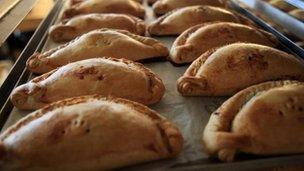DNA tests new challenge for food industry
- Published

Traces of pork DNA were found in halal pies destined for prisons in England and Wales
The long-established Strabane family firm McColgan's has been identified as the supplier of the halal meat products found to contain traces of pig DNA.
Halal meat is slaughtered in a particular way and the discovery of pig DNA in products destined for Muslim prisoners is embarrassing.
The products were being produced by McColgan's under contract for another business supplying food to prisons.
The issue now is how did this contamination happen?
This does not appear to be a deliberate attempt to introduce another meat.
Instead, traces of pig DNA in meat products were found as a result of ultra-sensitive DNA testing.
Traces can be detected at levels below 0.5 per cent.
The most likely explanation is that it was as a result of accidental contamination within the factory, which also makes pork-based products.
Warning
This use of DNA testing, in the wake of the horsemeat in burgers incident, is a major problem for the food industry.
Processing plants cannot proof themselves against minute levels of contamination, other than becoming dedicated to a single product.
This is why other products carry the warning 'may contain traces of nuts'.
Businesses may decide it is no longer worth producing products for such a specialist market, demanding standards that cannot be met under practical conditions.
The alternative is that they will have to warn that products may contain traces of other meats, which would not be acceptable to those wanting products guaranteed to meet halal standards.
This begins with a specialist slaughtering process in the abattoir, and now for the first time has been extended to the use of DNA for minced products.
This is not about hygiene or food safety, but about meeting standards, which McColgans may decide, makes the halal business no longer worth having.
For the wider food industry, questions will be raised about whether costly DNA testing will now become the norm for other meat-based products.
But the key question is whether this incident and the horse meat issue will have a negative impact on the image of Irish food products, be they from north or south of the border.
- Published4 February 2013
- Published3 February 2013